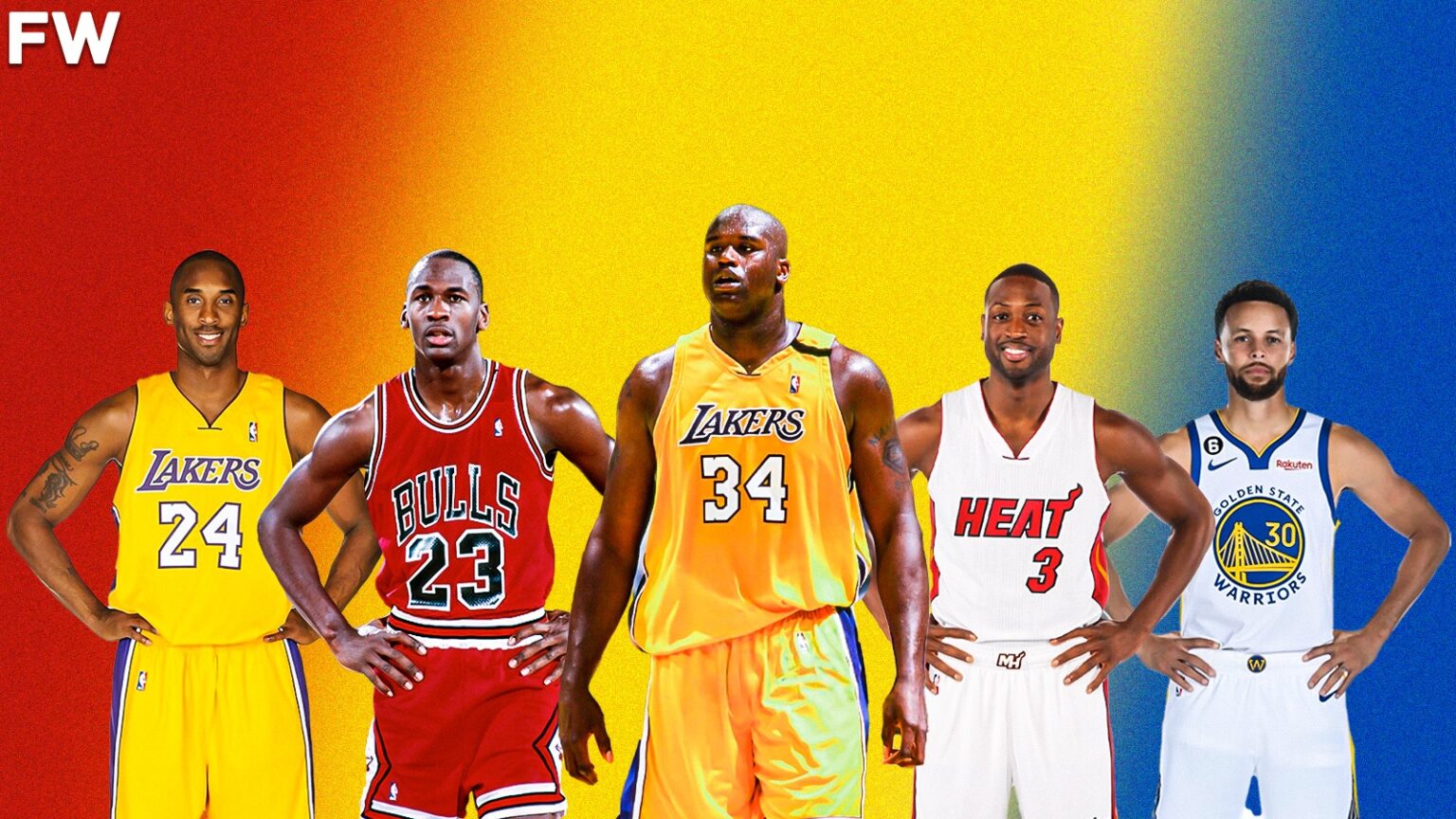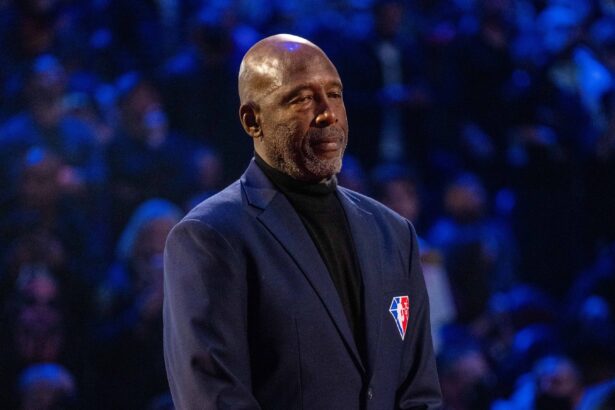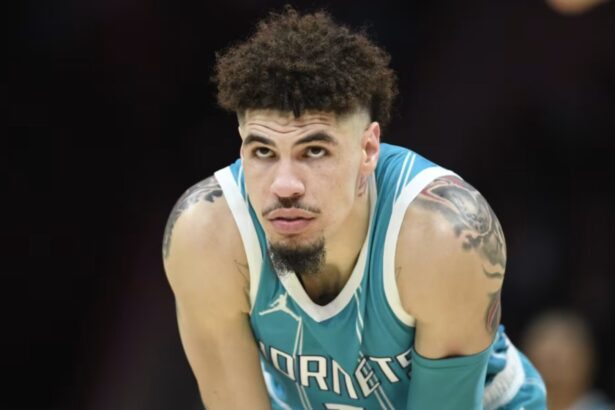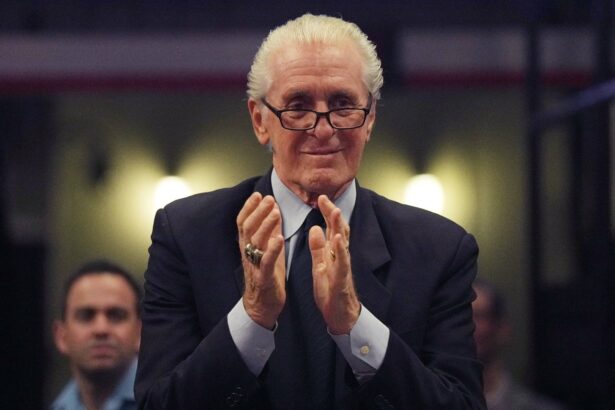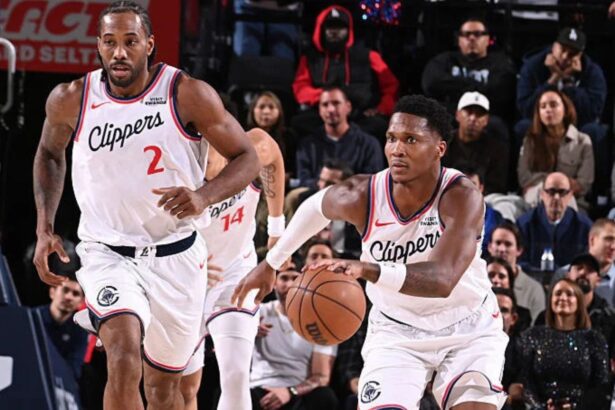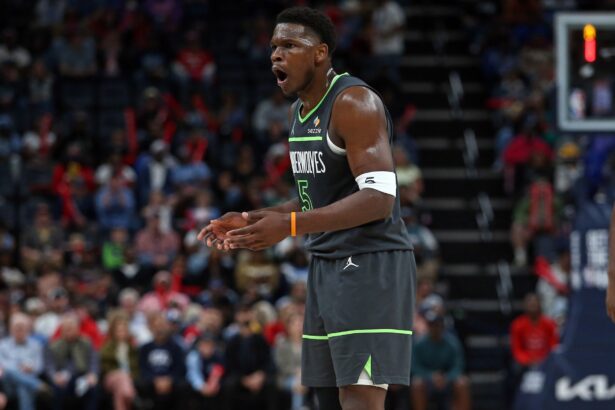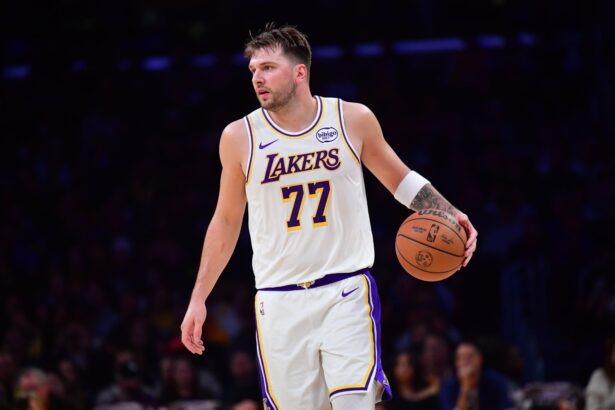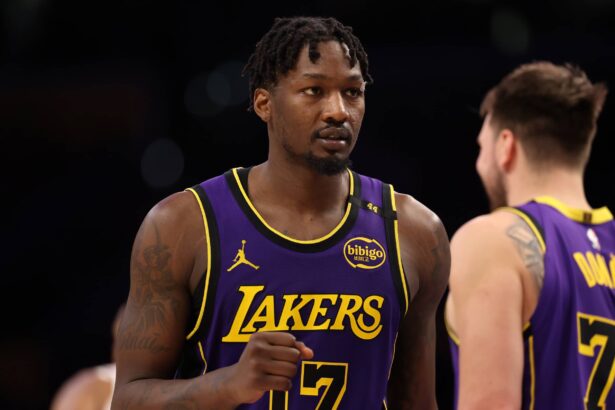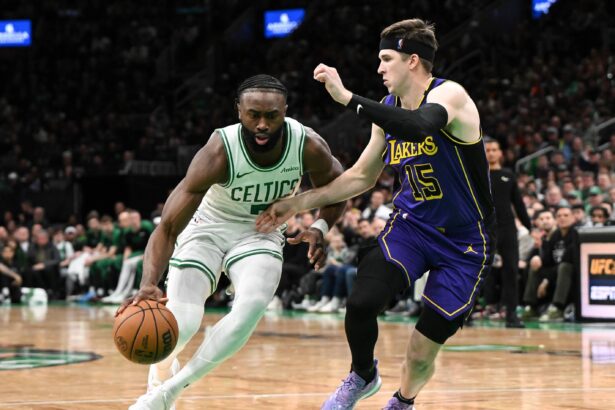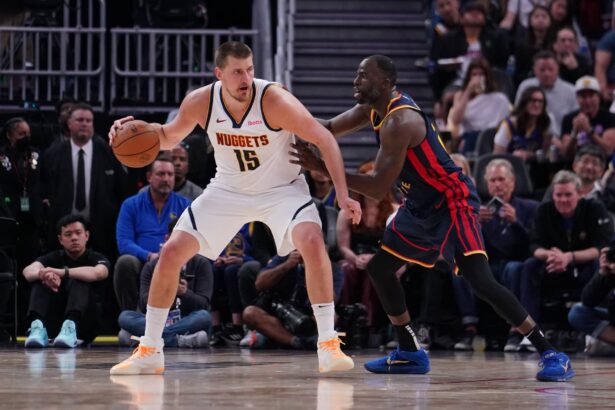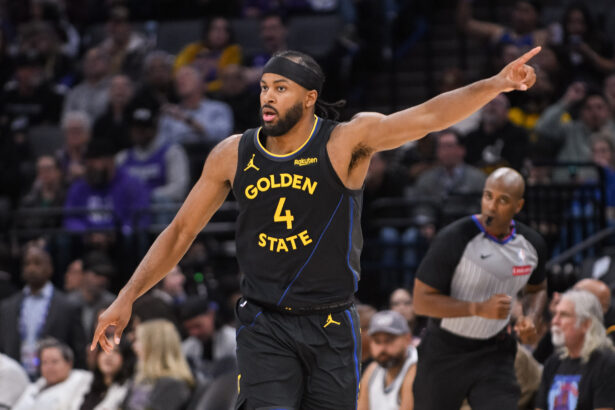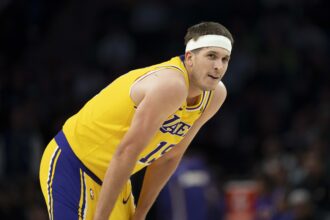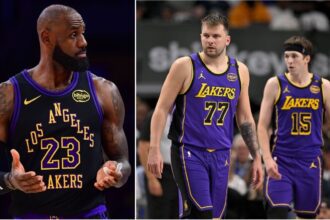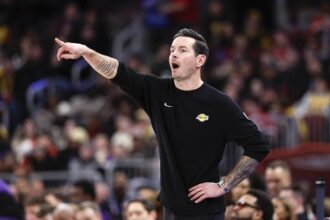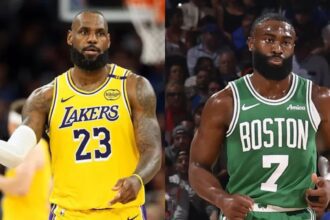- Michael Jordan owns four of the biggest scoring differences between a Finals MVP and their highest-scoring teammates
- Stephen Curry is the only Finals MVP to appear on this list since 2010
- Rick Barry is the only player before 1990 to appear on this list
Oftentimes, during the NBA Finals, the race for Finals MVP comes down to the best players on the winning team. Only one player has ever won the award in a losing effort, which came in 1969, the inaugural season of the award, and that player was Jerry West. Usually, the Finals MVP is a close race between teammates. Other times, one player has such a dominant performance, especially scoring the ball, that the voters have no choice but to award the Finals MVP to that player.
- 10. Michael Jordan – 1997 Finals – 12.3 PPG Difference
- 9. Stephen Curry – 2022 NBA Finals – 12.9 PPG Difference
- 8. Hakeem Olajuwon – 1994 NBA Finals – 13.5 PPG Difference
- 7. Kobe Bryant – 2009 NBA Finals – 13.8 PPG Difference
- 6. Michael Jordan – 1992 NBA Finals – 15.0 PPG Difference
- 5. Michael Jordan – 1998 NBA Finals – 17.8 PPG Difference
- 4. Rick Barry – 1975 NBA Finals – 18.0 PPG Difference
- 3. Michael Jordan – 1993 NBA Finals – 19.8 PPG Difference
- 2. Dwyane Wade – 2006 NBA Finals – 20.9 PPG Difference
- 1. Shaquille O’Neal – 2000 NBA Finals – 22.4 PPG Difference
Below are the 10 times that a Finals MVP outscored their closest teammates by the largest margins. These instances occurred in some of the highest-scoring Finals series ever by a player, with some players setting Finals records that could never be broken. Above anything else, these 10 players proved that they could be counted on to deliver with the ball in their hands during the biggest moments in the series no matter the circumstances of the series or the game at hand.
These are the 10 Finals MVPs with the biggest difference in points per game between them and their highest-scoring teammate.
10. Michael Jordan – 1997 Finals – 12.3 PPG Difference
Michael Jordan: 32.3 PPG
Scottie Pippen: 20.0 PPG
The 1997 NBA Finals is the first time we will see Michael Jordan on this list, but it certainly will not be the last. In the 1997 Finals, the Bulls would take on the Utah Jazz for the first time on the NBA’s biggest stage, pitting Michael Jordan and Scottie Pippen against John Stockton and Karl Malone. As great of a duo as Malone and Stockton were, they were no match for the more experienced Bulls.
To begin the series, Jordan would have back-to-back 30-point games to build a 2-0 series lead for Chicago with 31 points in Game 1 and 38 points in Game 2. After Utah tied the series at two games apiece in Games 3 and 4, Jordan went into overdrive, refusing to fall short in the Finals for the first time ever.
Jordan would go for 38 points in Game 5 and 39 points in Game 6 to seal the series for the Bulls and win his fifth career NBA championship and Finals MVP award. Jordan averaged 32.3 points, 7.0 rebounds, 6.0 assists, and 1.2 steals per game in the series. Pippen did his thing as well with 20.0 points, 8.3 rebounds, 3.5 assists, and 1.7 steals per game and proved once again why they were the superior duo to Stockton and Malone.
9. Stephen Curry – 2022 NBA Finals – 12.9 PPG Difference
Stephen Curry: 31.2 PPG
Andrew Wiggins: 18.3 PPG
Even after winning three NBA championships and two MVP awards, the Golden State Warriors and Stephen Curry were not getting the respect they deserved as a dynasty. The media had declared them dead, with pundits claiming there was no way they could win another championship after 2018. Stephen Curry set out to prove them wrong in the NBA Finals against the Boston Celtics.
Led by the duo of Jayson Tatum and Jaylen Brown, the Celtics were going to be a tough matchup for Golden State, but Curry had other plans. Curry led all scorers in a Game 1 loss with 34 points and would even the series in Game 2 with 29 points. He would add another 31 points in a Game 3 loss, the final game the Warriors would lose in the series. Curry would go for a series-high 43 points in Game 4 as well as 34 points in Game 6 to clinch the series for the Warriors and give them their fourth title in eight years.
Curry would be named Finals MVP, averaging 31.2 points, 6.0 rebounds, 5.0 assists, and 2.0 steals per game, shooting 48.2% overall and a scintillating 43.7% from three. Wiggins provided some great defensive play along with 18.3 points, 8.8 rebounds, 1.5 steals, and 1.5 blocks per game to seal the deal for Golden State.
8. Hakeem Olajuwon – 1994 NBA Finals – 13.5 PPG Difference
https://www.youtube.com/watch?v=M3LIzFcpdSo
Hakeem Olajuwon: 26.9 PPG
Vernon Maxwell: 13.4 PPG
The 1994 Houston Rockets were not supposed to win the NBA championship. Outside of Hakeem Olajuwon, the Rockets had no other All-Stars or All-NBA Team candidates. It was going to take a near-perfect season from Olajuwon, which is exactly what he would produce. Olajuwon was named MVP, Defensive Player of the Year, and eventually the Finals MVP in one of the most dominant single seasons ever.
After going 11-5 over their first three series, the Rockets were set to take on the New York Knicks, setting up an all-time great battle between Olajuwon and Knicks center Patrick Ewing. The series would go back-and-forth with Olajuwon recording two different 30-point games as they head into Game 7. In the decisive game, Olajuwon would lead his team to victory with 25 points, 10 rebounds, and 3 blocks.
Olajuwon was named Finals MVP with 26.9 points, 9.1 rebounds, 1.6 steals, and 3.9 blocks per game in the series, completing his perfect season. Vernon Maxwell was his highest-scoring teammate with just 13.4 points per game in the series, while Robert Horry and Sam Cassell averaged just over 10.0 points per game each.
7. Kobe Bryant – 2009 NBA Finals – 13.8 PPG Difference
https://www.youtube.com/watch?v=gRJjfmuKLRs
Kobe Bryant: 32.4 PPG
Pau Gasol: 18.8 PPG
After dropping the 2008 NBA Finals to the Boston Celtics, Kobe Bryant, Pau Gasol, and the Los Angeles Lakers were on a mission to redeem themselves in 2009. They would win 65 games during the regular season and steamroll toward the NBA playoffs. They would go 12-6 in the playoffs to earn their trip to the NBA Finals, where they were set to take on a young Orlando Magic led by Defensive Player of the Year Dwight Howard.
It turns out this series would be the easiest one in the entire playoffs for the Lakers as they would win the championship in five games led by Bryant and Gasol. Kobe would earn Finals MVP honors, averaging 32.4 points, 5.6 rebounds, 7.4 assists, 1.4 steals, and 1.4 blocks per game. Gasol was the perfect second option as well, with 18.8 points, 9.2 rebounds, and 1.8 blocks per game. It was the first of two straight NBA titles and Finals MVPs for Bryant which brought his ring total to five for his career.
6. Michael Jordan – 1992 NBA Finals – 15.0 PPG Difference
Michael Jordan: 35.8 PPG
Scottie Pippen: 20.8 PPG
After capturing their first NBA championship in 1991, the Bulls were still hungry for more in 1992. They would go on to field one of the best teams in franchise history, arguably better than the 1996 team that won 72 games. Michael Jordan would win another MVP award and his sixth straight NBA scoring title that season as nobody looked like they could stop the inevitable conclusion of them going back-to-back.
The Bulls would go 11-5 over their first three series in the playoffs, setting up a meeting between them and the Portland Trail Blazers in the NBA Finals. There, Michael Jordan would battle with fellow shooting guard Clyde Drexler for bragging rights as the best in basketball. It did not end well for Drexler. Jordan put on a show in the series that included eight threes in Game 1 and ended with 39 points and a win.
Jordan would have his best performance in Game 5 when he dropped 46 points and gave his team a 3-2 series lead. Jordan would seal the deal in Game 6 with 33 points and his second straight Finals MVP, averaging 35.8 points, 4.8 rebounds, 6.5 assists, and 1.7 steals per game on 52.6% shooting from the field. Pippen also contributed to the all-around play of his team with 20.8 points, 8.3 rebounds, 7.7 assists, and 1.5 steals per game.
5. Michael Jordan – 1998 NBA Finals – 17.8 PPG Difference
Michael Jordan: 33.5 PPG
Scottie Pippen: 15.7 PPG
The 1998 NBA Finals was officially dubbed The Last Dance due to the fact that Bulls management was ready to move on from coach Phil Jackson and Scottie Pippen at its conclusion. Michael Jordan repeatedly said he would never play for another coach, meaning it was going to be his final season in Chicago as well, so they had to end it in the most meaningful way possible.
After winning 62 games in the regular season, the Bulls would go 11-4 in their first three playoff series to advance to the NBA Finals. Waiting for them, there was the Utah Jazz once again, but this time, many believed the Jazz had a chance to dethrone the Bulls and stop them from completing their second three-peat. Not if Michael Jordan had anything to say about it.
After going up 3-1 in the series behind a masterclass from Jordan, the Jazz would win Game 5 in Chicago, swinging the momentum in their favor. Jordan would not be denied even as the Jazz led late in the game by one point. First, Jordan would strip Malone with under a minute left, giving Chicago possession. With the ball in his hands, Jordan took a few dribbles toward the foul line, switched to his left past a sliding Bryon Russell to drain what would be the game-winning shot. Jordan and the Bulls had completed their second three-peat as NBA champions while Jordan claimed his record sixth Finals MVP with 33.5 points per game on 46.5% shooting.
4. Rick Barry – 1975 NBA Finals – 18.0 PPG Difference
https://www.youtube.com/watch?v=NCjfasD6K38
Rick Barry: 29.5 PPG
Jamaal Wilkes: 11.5 PPG
Rick Barry is one of the greatest scorers in NBA history as well as one of the greatest players in Golden State Warriors history. Barry led the Warriors to a modest 48-34 record during the 1975 season, which set up a tough road in the NBA playoffs for his team. As they went 8-5 in their two rounds before the NBA Finals, the Warriors advanced to play the Washington Bullets in the Finals led by Wes Unseld and Elvin Hayes.
Not even the duo of Unseld and Hayes were enough to outduel Barry and the Warriors, and the Finals would prove to be the easiest series for Golden State on their way to their first NBA championship. Barry would have his best games in Games 3 and 4 as he dropped 36 and 38 points, respectively, to lead the charge in a four-game sweep of the Bullets. Barry would win Finals MVP honors with 29.5 points, 4.0 rebounds, 5.0 assists, and 3.5 steals per game. Teammate Jamaal Wilkes would back him up with 11.5 points, 9.8 rebounds, and 1.8 steals per game.
3. Michael Jordan – 1993 NBA Finals – 19.8 PPG Difference
Michael Jordan: 41.0 PPG
Scottie Pippen: 21.2 PPG
After defeating the Trail Blazers in the 1992 NBA Finals, the Bulls did not let their feet off the gas in 1993. They wanted to make history as the first team since the Boston Celtics of the 1960s to win three championships in a row. Led by Michael Jordan, they would get off to a good start in achieving that goal with a 57-25 record during the regular season.
The Bulls would cruise through the first three rounds of the playoffs with an 11-2 record in wins over the Hawks, Cavaliers, and Knicks. In the NBA Finals, the Bulls were set to take on one of the best teams in basketball, the Phoenix Suns, led by MVP Charles Barkley. Bulls General Manager Jerry Krause was reportedly infatuated with Suns forward Dan Majerle, which was added motivation on top of Barkley winning MVP for him to have one of the best Finals performances ever.
Games 2 through 5 would be an absolute thrashing at the hands of Jordan. He would go for over 40 points in each of those games, with his best performance coming in Game 4. Jordan dropped 55 points in that Game 4 win as they built a sizable lead in the series. Jordan would close things out in Game 6 with 33 points and claim Finals MVP status for the third straight year, averaging 41.0 points, 8.5 rebounds, 6.3 assists, and 1.7 steals per game on 50.6% shooting from the field.
2. Dwyane Wade – 2006 NBA Finals – 20.9 PPG Difference
Dwyane Wade: 34.7 PPG
Antoine Walker: 13.8 PPG
The 2006 Miami Heat featured many talented NBA legends just a bit past their prime and a budding superstar in his third season. Shaquille O’Neal was also an integral part of the squad, as well as Antoine Walker, Jason Williams, Gary Payton, Alonzo Mourning, and the young budding superstar I was referring to, Dwyane Wade.
Wade would lead the Heat to 52 wins in the regular season and a 12-5 record over the first three rounds of the NBA playoffs to reach the NBA Finals against the Dallas Mavericks. After falling down two games to none, Wade began to erupt and put the Heat on his back, going for 42 points in Games 3, 36 points in Game 4, 43 points in Game 5, and 36 points in Game 6 to lead Miami to four straight wins and the first NBA championship in franchise history.
Wade would take home Finals MVP honors with 34.7 points, 7.8 rebounds, 2.7 steals, and 1.0 blocks per game on 46.8% shooting. Antoine Walker chipped in with 13.8 points per game, and Shaq added 13.7 points and 10.2 rebounds per game to contribute to the win.
1. Shaquille O’Neal – 2000 NBA Finals – 22.4 PPG Difference
Shaquille O’Neal: 38.0 PPG
Kobe Bryant: 15.6 PPG
The 2000 Los Angeles Lakers are one of the greatest teams ever assembled in NBA history. Furthermore, they were led by the most dominant version of the most dominant player in NBA history, Shaquille O’Neal. During the 2000 season, Shaq would take home the MVP award for the first and only time in his career as well as the All-Star Game MVP, and eventually the Finals MVP award.
After leading the Lakers to 67 wins during the regular season, O’Neal dominated the playoffs and led the Lakers to an 11-6 record over their first three rounds in the playoffs. This set up a date with the Indiana Pacers in the NBA Finals who were led by Reggie Miller and Jalen Rose. Although the Pacers would put up a fight and win two games, they were no match for O’Neal and the rest of the Lakers squad.
O’Neal would go for 43 points and 19 rebounds in a Game 1 win, then 40 points and 24 rebounds in Game 2. He would lead all scorers in each game of the series which included a 41-point game to close it out in six. In the easiest Finals MVP selection of the last 30 seasons, O’Neal earned the honors for the first time, averaging 38.0 points, 16.7 rebounds, 1.0 steals, and 2.7 blocks per game. Meanwhile, in his first NBA Finals, Kobe Bryant averaged 15.6 points per game on 36.7% shooting from the field, finishing second on the team in scoring.
We sincerely appreciate and respect you as a reader of our site. It would help us a lot if you follow us on Google News because of the latest update.
Thanks for following us. We really appreciate your support.

